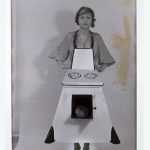 Frauenmuseum Hittisau (Web)
Frauenmuseum Hittisau (Web)
Eröffnung: 04.07.2020, 17.00 Uhr
Ort: Hittisau, Ritter von Bergmannsaal
Anmeldung unter: kontakt@frauenmuseum.at
Wir alle sind geboren worden. Vor zwanzig Jahren wurde das Frauenmuseum Hittisau aus der Wiege gehoben. Dieses Jubiläum feiern wir mit der Ausstellung „geburtskultur. vom gebären und geboren werden“.
Geburtskultur – worum es geht
Die Ausstellung wurde von Stefania Pitscheider Soraperra (Frauenmuseum Hittisau), Brigitta Soraperra (IG Geburtskultur) und Anka Dür (IG Geburtskultur) kuratiert.
Sie beleuchtet das Thema Geburt und Geburtskultur aus unterschiedlichen Perspektiven. Auf einem historischen Streifzug bietet sie Einblicke in das jahrtausendealte Hebammenwesen, sie stellt weltweite Geburtsrituale vor und beleuchtet aktuelle Diskussionen rund um die Möglichkeiten der Reproduktionstechnologien.
Zeitzeug*innen kommen zu Wort und erzählen ihre persönlichen Geschichten rund um ihr Mutter- und Vatersein. Zahlreiche Kunstpositionen erweitern das Thema um persönliche Zugänge und neue Sichtweisen. Weitere Informationen … (Web).
Vielfältiges Rahmenprogramm
Die Ausstellung wird während der gesamten Dauer von einem vielfältigen Rahmenprogramm begleitet, in dem alle möglichen Themen rund um „Geburtskultur“ vertiefend aufgegriffen werden. Im Juli 2020 startet das Programm mit zwei Kochkursen, die auf einen alten Brauch zurückgehen:
„Die fette Henne war da!“: Frischgebackene Eltern und ihre Babys werden von Continue reading
Monthly Archives: Juni 2020
Frauen*spaziergänge mit Petra Unger: Programm im Juni und Juli 2020: „Supertramps“ | Wieden | Penzing, Wien
 Frauen*Spaziergänge mit Petra Unger (Web)
Frauen*Spaziergänge mit Petra Unger (Web)
Frauen auf der Straße – Zwei Expertinnen im Dialog
SUPERTRAMPS Guide Sandra und Petra Unger geben in Form einer Dialog-Führung Einblicke in die Wohnungslosigkeit aus Betroffenenperspektive, ergänzt durch einen feministischen Blick auf die Geschichte der jeweiligen Orte und auf die heutige Situation der Wohnungslosenhilfe für Frauen. Termine: 17. und 24. Juni sowie 3. Juli 2020 um 18.00 Uhr. Anmeldung und Details auf der Website.
Frauen*Spuren auf der Wieden
Von Frauen*Rechtlerinnen, Mädchenbildung und Künstlerinnen: Die Gründerinnen des Frauen*Erwerb Vereins setzen sich für Mädchenbildung ein, Rosa Mayreder ist die bekannteste Theoretikerin der Ersten Frauenbewegung in Österreich, Edith Tudor-Hart tritt mit ihrer Fotografie für den Kampf gegen Armut ein und Grete Urbanitzky schreibt als eine der ersten Frauen* über Homosexualität. Termin: 25. Juni 2020 von 17:00 bis 19:30 Uhr. Anmeldung und Details auf der Website.
Von Galeristinnen und Künstler*innen
Galeristinnen machen Künstler*innen bekannt, stellen sie aus, vertreten sie, “kümmern” sich um Kunst und Kunstschaffende. Wie wird Frau Galeristin? Was bedeutet es, eine Galerie zu betreiben? Fördern Galeristinnen Künstlerinnen? Und wie wirkt sich Covid 19 auf Kunstmarkt und Künstler*innen aus? Termin: 4. Juli 2020 von 11:00 bis 13:30 Uhr. Anmeldung und Details auf der Website.
Von Widerstandskämpferinnen, Technikerinnen und Mäzeninnen
Wem ist das Denkmal vor der Paulanerkirche gewidmet? Wie lässt sich die Geschichte der Frauenbewegungen finden und warum können nur Frauen* im Archiv Stichwort forschen? Wo hat Hedy Lamarr geheiratet? Wer waren die ersten Frauen an der Technischen Universität? Und wer war Lilli Lieser? Termin: 9. Juli 2020 von 17:00 bis 19:30 Uhr. Anmeldung und Details auf der Website.
Frauen*Vielfalt in Penzing (Wiederaufnahme) Continue reading
Klicktipp: „Donne in rivista“: New issue of the journal Storia delle Donne – with an overview of feminist journals (Open Access)
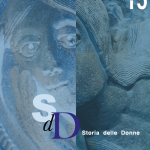 Storia delle Donne (SdD), Vol 15, No 15 (2019): Donne in rivista (Web)
Storia delle Donne (SdD), Vol 15, No 15 (2019): Donne in rivista (Web)
The new issue „Donne in rivista“ of the Italian feminist journal Storia delle Donne (Women’s History) presents 10 different journals that deal with women’s and gender history.
This provides an up-to-date inventory of these resources. The texts are written in Italian, French or English. The issue is freely available online (Web)
About Storia delle Donne
The first issue of Storia delle Donne was published in 2005. The journal was foundet as a the collaboration of specialist scholars from different periods and disciplines – trained in schools of various Italian universities – and is proposed as a publication with a high scientific content. The current editor-in-chief is Dinora Corsi from the University of Florence.
SdD has an annual frequency, the numbers are thematic and almost completely devoid of headings because of the editorial choice to present each issue as a unicum in order to better understand, focus and develop the evidence and importance of the proposed topic.
The idea behind the SdD project looks at the link between history and women’s politics, but gives priority to the one between history and politics for women and with women; this is one of the reasons why the choice of the theme of the files is dictated by the processes in progress and the urgency that contemporary society proposes. The theme is developed in the Present section by contributions that illustrate it with cross-references of intentionally multidisciplinary approach and method, without this identifying SdD with the interdisciplinary nature of Women’s Studies.
In the Past section the essays give back the historical and diachronic depth in the longue durée, which stretches from ancient civilizations to the contemporary age. SdD pays particular attention to the research of young scholars and scholars.
All texts published in SdD are evaluated, according to the double blind peer review method, by two referees identified within a wide circle of specialists.
Diskussion: Denkmäler stürzen – Geschichte unbefleckt?, 26.06.2020, Wien
Verband feministischer Wissenschafteri*nnen // Reihe „feminismen diskutieren“ (Web)
Zeit: Fr., 26.06.2020, 19.00 Uhr
Ort: Depot, Breite Gasse 3, 1070 Wien
Anmeldung: depot@depot.or.at
Bilder von stürzenden Denkmälern gehen als emotional aufgeladene Befreiungsakte von totalitären Denk- und Herrschaftssystemen durch die Medien. Nachdem im Verlaufe der weltweiten Proteste gegen Rassismus im englischen Bristol die Statue des Sklavenhändlers und Wohltäters Edward Colston gestürzt und im Fluss versenkt worden war, sind allerorts wieder Denkmal-Sturz-Debatten aufgeflammt.
Denkmäler von Kolumbus, Gandhi, Winston Churchill, Paul Koch und Kant werden als Rassisten-Repräsentationen diskutiert. Steht dahinter berechtigte Wut? Vandalismus? Oder puristische political correctness als neues, globalisiertes Denk-Normativ?
Am Podium:
- Minna Antova, Künstlerin und Kuratorin, Wien und Baden bei Wien
- Ilse Chlan, bildende Künstlerin, Wien
- Teilnehmende Moderation: Sabine Prokop (VfW)
Beschränkte Teilnehmer*innenzahl von 25 Personen; Anmeldung per Mail: depot@depot.or.at unbedingt erforlderlich.
Quelle: Female-l
Klicktipp: SQS Journal: Queer Studies in Finland (Online Journal) // CfP: Queer Shepherds (Publication); by: 31.08.2020
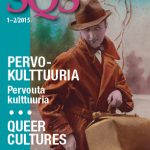 SQS Journal (Web)
SQS Journal (Web)
SQS Journal is a peer-reviewed journal published by The Society for Queer Studies in Finland (SQS). It appears since 2006.
The aim of SQS Journal is to explore and challenge normative categories such as gender, sexuality, race and class. The issues are avalable in open access on the website.
CfP: Queer Shepherds
Proposals by: 31.08.2020
The SQS and the International Association for the Study of Religion and Gender (IARG) (Web) invite submissions for articles and other texts for a special issue „Queer Shepherds“.
The relationships between religions, LGBTIQ* persons and perspectives and queer studies have often been complicated. On the one hand, in media and public opinion, established religions are often perceived as limiting sexual and gender diversity. On the other hand, queer studies? perspective on religion, religious experiences and religious studies has been on the rise. Queer studies of religions enable versatile theoretical and intersectional approaches.
The theme issue is inspired by the Pervot paimenet Queera herdar|Queer Shepherds conference organised by the SQS in collaboration with the IARG in Turku, Finland in autumn 2019 (Web). The theme issue is open for writers regardless if they participated in the event or not.
The editors invite researchers in queer studies, religious studies, and other disciplines interested in the intersections between sexuality, gender and religion to discuss how shepherds and shepherding are visible in different times and societies. The aim of the special issue is to address the question of queer shepherding from multiple perspectives. Shepherding is often connected to churches and religious use of power. Shepherd and shepherding can also be approached from other perspectives of normativization, boundaries and exclusion. How are we being shepherded? What kind of queer shepherding exists? How shepherding or queer shepherds are perceived in religion, films, literature, political discussion or history? Continue reading
Klicktipp: The Journal of Autoethnography (Online Journal) // CfP: Queer(ing) Kinships: Using Autoethnography to Uncover the Realities of Heterosexism and Cissexism; by: 30.06.2020
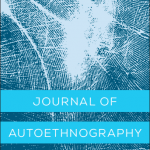 The Journal of Autoethnography (JoAE) (Web)
The Journal of Autoethnography (JoAE) (Web)
The Journal of Autoethnography (JoAE) is a refereed, international, and interdisciplinary journal devoted to the purposes, practices, and principles of autoethnography. This is a form of qualitative research in which an author uses self-reflection and writing to explore personal experience and connect this autobiographical story to wider cultural, political, and social meanings and understandings.
JoAE publishes scholarship as well as reviews that foregrounds autoethnography as a method of inquiry; highlights themes and issues of past and contemporary autoethnographic research; discusses theoretical, ethical, and pedagogical issues in autoethnography; identifies future directions for autoethnography; and highlights innovative applications of autoethnography.
CfP: Queer(ing) Kinships: Using Autoethnography to Uncover the Realities of Heterosexism and Cissexism
Proposals by: 30.06.2020 (Web)
This proposed forum uses autoethnography to bring the ‚walls‘ we encounter (Ahmed, 2017) as queer folx to life. Contributors will demonstrate the institutional absence of queerness, particularly as it interacts with other aspects of social location and identity, through the deeply personal impact(s) of these broader cultural erasures and dismissals. In so doing, contributors will also identify the ways we resist these erasures such as queer family making.
In this way, autoethnography proves an ideal method for revealing heterosexist and cissexist discriminatory mechanisms on a variety of levels including, but not limited to, the interpersonal, state/federal, medical, and judicial as well as the opportunities for social justice interventions than can improve the livability of queer lives. This forum will prioritize intersectional considerations of queer experiences that engage with additional aspects of identity such as: nationality, (dis)ability, class status, race, and religion, among others.
Contributors are asked to: Continue reading
CfP: Urban Exile: Theories, Methods, Research Practices (Publication); by: 15.07.2020
Ekaterina Aygün, Burcu Dogramaci, Mareike Hetschold, Laura Karp Lugo, Rachel Lee and Helene Roth, Institut für Kunstgeschichte, LMU Munich
Proposals by: 15.07.2020
Although it is widely accepted that migration shapes cities, until now, exile research has rarely been written from an urban perspective. By taking up this challenge, this publication will make a significant contribution to the theory and methodology of research on exile, cities and modernities. It will focus on historical dislocations in the first half of the 20th century, when modern movements constituted themselves in global exchange.
In cities around the world migration contributed significantly to the transformation of urban spaces by forming new communities, neighbourhoods and artists‘ quarters. Experiences of exile by locals and migrants alike shaped a basis for changed perceptions of the urban spaces in which they lived and worked. When we examine artistic practices, for example, we find evidence of migrants capturing their new surroundings in photographs, drawings and writings.
Taking an interdisciplinary approach and a historical perspective, the contributions to this volume will formulate various theoretical and methodological approaches as well as research practices, investigating how exile and urbanity are intertwined. Drawing on examples from a wide range of urban centres around the world, contributors from various disciplines will share their thoughts, experiences and concepts relating to the challenges and benefits surrounding the nexus of exile and urban research.
This anthology will engage lines of inquiry from contemporary post-migrant urban research and historicize them. By choosing the term exile as a central category for methodological and theoretical investigations of urban culture, we aim to rethink its application in a transnational, global context, thereby considering the varying concepts, historical usages and trajectories behind it. Read more and source … (Web)
CfP: Heroines of the Holocaust: Frameworks of Resistance (Event: Staten Island/NY, 06/2021); by: 15.08.2020
Wagner College Holocaust Center (Web)
Venue: Staten Island, New York
Time: 02.-03.06.2021
Proposals by: 15.08.2020
„Nobody taught us how to fight or to perform our duties. We learned by ourselves not only how to clean and use a gun, but how to conduct ourselves in combat and battle, how to blow up a bridge or a train, how to cut communication lines and how to stand on guard.“ Sara Ginaite, partisan, March 8, 1944, International Woman’s Day.
The activities of women during the Holocaust have often been forgotten, erased, misunderstood, or intentionally distorted. Jewish women and those of all faiths fought with dignity, compassion and courage to save others from the murderous Nazi regime in over 30 nations. Often overlooked, women as well as men played critical roles in uprisings against the Nazis in over 50 ghettos, 18 forced labor camps and 5 concentration camps, including Auschwitz.
Women were critical to the Jewish underground and other resistance networks both as armed fighters and as strategists and couriers of intelligence and false papers. Women played essential roles operating educational, cultural and humanitarian initiatives. In other genocides, women also faced horrendous atrocities, yet distinguished themselves with resilience and acts of moral courage. This symposium hopes to create a new narrative around agency in the Shoah and other genocides, which may inspire transformative activism today.
From the groundbreaking 1983 conference on “Women and the Holocaust” at Stern College to the 2018 symposium on “Women, the Holocaust and Genocide” at Seton Hill University, research on gender issues has grown exponentially. Innumerable books, conferences, panels, films, journal special issues, and groups such as Remember the Women Institute, now document the inspiring lives of female participants. Yet, there remain many untold stories of women fighting back against the Nazis with pistol or pen.
The leadership strategies, networks of defiance and testimony of better-known activists, such as … read moren and source (Web).
Vortag: Brot und Rosen – 130 Jahre Arbeiterinnenbildungsverein, 29.06.2020, Wien
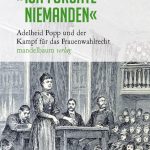 Kritische Literaturtage, Klub der politisch interessierten Frau, BDFÖ und Labor Alltagskultur (Web)
Kritische Literaturtage, Klub der politisch interessierten Frau, BDFÖ und Labor Alltagskultur (Web)
Zeit: Mo., 29.06.2020, 18:00-21:00 Uhr
Ort: Labor Alltagskultur, Kolonieweg 48, 1120 Wien (Nähe U6 Tscherttegasse)
Am 29. Juni 1890 wurde der erste Arbeiterinnenbildungsverein gegründet. Das war die Geburtsstunde der proletarischen Frauenbewegung in Österreich. Gernot Trausmuth hat diese Geschichte in einer Monografie dargestellt. In dem Vortrag wird er über die schwierigen Anfänge dieser Selbstorganisierung von Arbeiterinnen erzählen. Wie es bei den Veranstaltungen des Arbeiterinnenbildungsvereins üblich gewesen ist, wird es an dem Abend auch eine kleine „Jux-Post“ mit Rätseln und kurzen literarischen Texten geben.
Gernot Trausmuth: »Ich fürchte niemanden.« Adelheid Popp und der Kampf für das Frauenwahlrecht, Wien 2020 (Web)
Verlagsbeschreibung: „Das allgemeine, gleiche Wahlrecht »aller Staatsbürger ohne Unterschied des Geschlechts« war eine der wichtigsten Errungenschaften der Revolution am Ende des Ersten Weltkriegs. Am 4. März 1919 konnten endlich die ersten weiblichen Abgeordneten im österreichischen Parlament angelobt werden. Unter ihnen befand sich Adelheid Popp (1869–1939), die auf drei Jahrzehnte des Kampfes für das Frauenwahlrecht zurückblicken konnte. Als junge Fabrikarbeiterin war Popp der Sozialdemokratie beigetreten und hatte wie keine andere Anteil am Aufbau einer starken proletarischen Frauenbewegung.
Das allgemeine (Frauen-)Wahlrecht war für die »Erweckerin der Frauen« kein Ziel an sich, sondern nur ein Mittel im Streben nach umfassendem Arbeiterinnenschutz, kürzeren Arbeitszeiten und letztlich einer Welt ohne Ausbeutung. Diese Biografie zeichnet ihr Leben und Wirken bis zu ihrem Einzug ins Parlament nach und gibt dabei einen völlig neuen Blick auf die Theorie und Praxis der frühen ArbeiterInnenbewegung.“
CfP: Alps and Resistance: conflicts, violences and political reflections (1943-1945) (Publication); by: 30.06.2020
Francesco Scomazzon, University of Milan
Proposals by: 30.06.2020
What is the relationship between the Alps and the Resistance during the Italian Social Republic? Around this question the editors want to deepen the function of the Alps as a “centre” of battles, violences and opposition to fascism, as well as the cradle of political debate destined to forge the modern Italian and European democracy.
The editors invite submissions from scholars who work on the phenomenon of violences, exile and refugees during the Italian Social Republic (1943-1945). The editors are interested in articles that discuss the role of the Alps as a centre of violences, battles and resistance, focusing on their geo-political, military and economic role. The editors are also interested in manuscripts that deal with the Alps as a refuge and escape place, with particular attention to the role of Switzerland in accepting and rejecting italian political and racial refugees.
The editors hope to receive papers that deal with the Alps – barrier and connection between Italy and Switzerland – as laboratory of democratic discussion for new institutional forms, such as regional autonomies and federalism.
The editors welcome contributions, but not exclusively, on:
- Violence and resistance on the Alps: fascists and partisans
- Live the war on the border: the alpine communities
- Escaping Salò violences: smugglers, passeurs and Jews
- Women on the Alps: social, economic and political relations … read more and source (Web).
